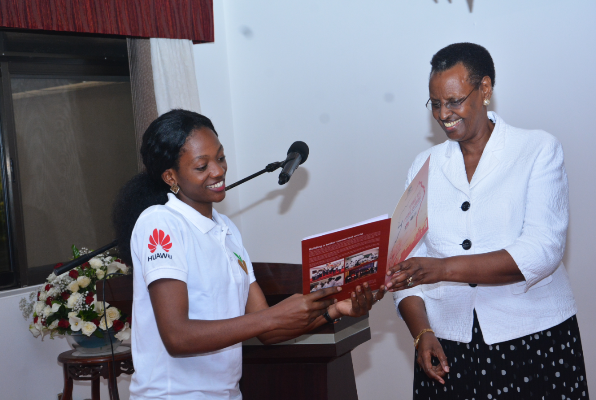Every fourth Thursday in April is International Girls in ICT Day. This initiative by the International Telecommunication Union started in 2011 with over 300,000 girls and young women have taken part in more than 9,000 celebrations of International Girls in ICT Day in 166 countries worldwide.In Uganda, as we are bridging digital gap with various efforts, there is still Gender Gap in ICT.
A gender statistics report in Uganda in Information and Communication Technology for Women’s Empowerment and Gender Equality by Dr. Dorothy Okello on 14th November 2017 placed males above females in the owning a mobile phone, using a computer, using the internet and also placed women in urban areas above those in rural areas in uptake of the same.
Maria Drolence, a graduate from Mbarara University, who was chosen to join 2017 Seeds for the Future, an ICT training program sponsored by Huawei, an international ICT solutions provider.
“This program actually taught me that there is a lot going on out there, a lot of innovations coming up every day to make life better and less tasking. I also able to learn that anything is possible it just takes focus, perseverance and then a breakthrough will surely happen.The Seeds for the Future Program enlightened and broadened my thinking towards ICT innovations considering i was able to get out of the caged environment and explore newer and advanced ICT possibilities”, says Maria.
Through this program, Huawei selects top college students and young government officials working in ICT-related departments for a study trip in China. Over 2700 students globally have taken part in this program.
In Uganda, this program was flagged off by H.E. Yoweri Museveni began in Uganda in 2016 with 10 ICT talents visiting china at Beijing and the Huawei headquarters of Shenzhen. These were trained in the Chinese culture and cutting-edge ICTs lessons, enterprise management experience sharing, lab practices. Out of the 30 students that have taken part since 2016, 10 of these have been girls.
The 2017 gender statistics report in Information and Communication Technology for Women’s Empowerment and Gender Equality further explains the low usage of Internet because it is unaffordable, and the few that would afford lack of knowledge and access to it.
However, the jinx of lack of knowledge and affordability is being broken by programs including seeds for the future, free training by Learn it institute of Business and technology and free ICT training from SINFA Uganda, whose motive is to nurture professionals who are urgently needed to drive the development of the ICT industry and seeks to close the gap between knowledge learned in the classroom and the skills required by the industry, and enhance knowledge transfer.
Maria, who is now employed by Huawei Technologies, in the Information Technology Operations Department said the training helped her get out of the caged environment and explore new possibilities in her life.
“I was able to explore the latest technological trends such as the smart education solution which enables individuals to study over long distances using E-Classrooms. This e-learning solution not only enhances knowledge sharing but also greatly bridges the rural-urban education gap. The Smart metering system that enhances mobile meter monitoring in that once the period paid for expires, the water is automatically disconnected until payments are paid. These payments can be over mobile platforms such as mobile money.” says Maria Drolence.
Sylvia Nakanwagi, a 2016 Seeds for the future participant and also now working for National Information Technology Authority Uganda in her article to the Seeds for the Future Memoir 2016 stated that broadband connectivity is the core for ICT investment and innovation that facilitates development in other sectors of the country.
“What is clear is that the country Uganda needs to look into a national policy that encourages investment in broadband infrastructure, services and applications especially under the umbrella of a Public-Private Partnership (PPP). The government together with its key partners need to enter into a nation-wide awareness campaign to demonstrate the capabilities of broadband in elevating Uganda’s technological and economic status”.
International Girls in ICT Day initiative aims to create a global environment that empowers and encourages girls and young women to consider careers in the growing field of ICTs.
To achieve this goal, there is a need of a joint effort between public and private sector to enable both girls and technology companies to reap the benefits of greater female participation in the ICT sector for Uganda.
Cleopatra Ajambo, a 2018 participant from Makerere University expresses how the Seeds for the future program has been important to her as a girl.
“Many girls doing IT in Uganda basically are looking forward to just having a degree but this program has opened us to a challenge were girls all over the world hold big IT position,” Cleopatra said, “I look forward to use that exploration to think out of the box to do something for Uganda.”




